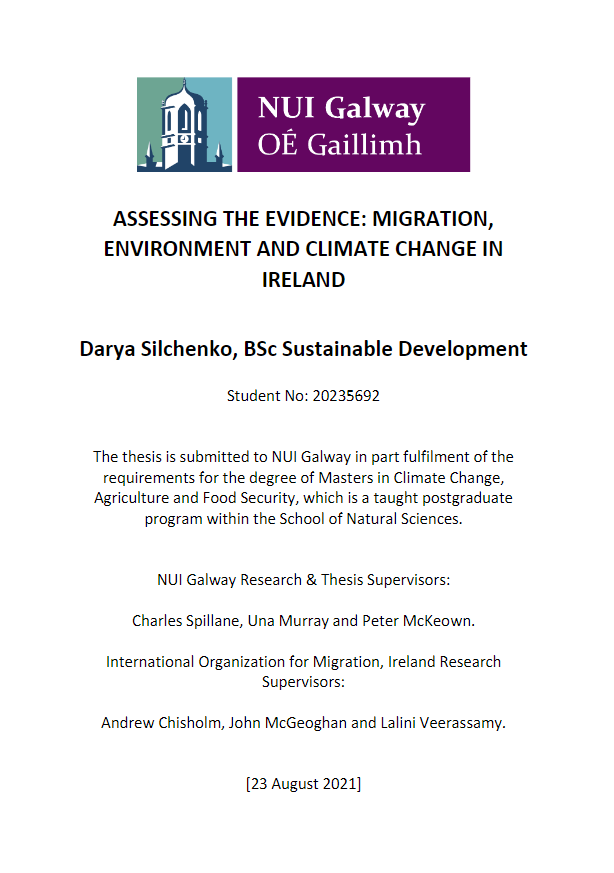Today I submitted my MScCCAFS thesis! What an interesting project process this was… I learned a lot not only about the topic, but about the process of writing an extensive report that does not currently have a lot of information relating to the intended subject matter of the research.

When I initially began planning for this report and searching for relevant and available information, I found that while there is extensive literature from organizations such as the EPA, Met Eireann, the Office of Public Works, etc, on the impacts of climate change and environmental risks in Ireland, there was scant information on how these are affecting migration decisions, displacement and relocation processes in Ireland. These initial findings prompted me to believe that the motivations behind the IoM research were timely, necessary and an important addition to the gaining momentum of climate change and migration discourse. As I built the report, the sense of timeliness only became clearer.
While progressing through the assessment and learning more about the current and potential futures of the MECC nexus in Ireland, I realized that this report could be much more extensive than I originally presumed. Again, this emphasized the relevance and timeliness of the research, and I started to think of how there could be a lot of research to follow from the findings of this report. For example, I found that while many of the findings on these risks will mention displacement as an outcome of these events, there is a lack of data/further explanation on this. This makes it difficult to track who is displaced, for how long, where they are displaced to, etc. The lack of available data also creates the illusion that the issue of migration and displacement in connection to climatic change in Ireland does not exist, which is far from true. I am hoping this Country Profile could promote progress towards more tracking of this pertinent information.
As I continued to search for information, I came to the understanding that when the information I am looking for is not explicitly out there, it is my role as a researcher to bridge the gap between the existing information and make the connections that have not been identified yet. This does not mean that I make assumptions or force connections where there are none, conversely, I identify where connections exist but have not been recognized extensively yet. Identifying knowledge and research gaps can be equally as important as finding clear information and empirical evidence. The research method allows us to answer some questions, but overall, it elicits more important questions. With hard work and looking in all the right places, the further the research goes, the more the connections stand out. As my questions begin to expand, instead of reducing as I had originally supposed they would, the more I came to understand the MECC nexus in Ireland – even though that may sound counterintuitive. Overall, the questions and research gaps I have been able to identify in the Country Profile make me confident that this research is pertinent and will produce an important part of the dialogue for Ireland’s future, while also stimulating more work in this area.
Hopefully, the findings and questions from this report may attract others to pursue the interlinkages for Ireland and migration, climate change and the environment as well. This report could have significant contributions to Ireland’s trajectory towards climate and migration mainstreaming, and as the first European MECC country profile, more country profiles from the EU countries may follow this lead. Hopefully these recognitions will ignite more research and attention to the MECC nexus in Ireland, as this will allow for more recognition from a policy perspective – thus leading to the intended goal: more support for those impacted. As there is no empirical evidence on the current state of climate-induced migration in Ireland, a variety of different futures are possible. This is why it is crucial to have proactive approaches ready to support vulnerable locations/populations by ensuring Ireland is prepared to deal with potentially unprecedented internal and international migration flows.
In bringing together the existing literature and policy processes, my hope is that this IoM Country Profile would bring the nexus to light, advancing further research into it and engaging more stakeholders as well as stimulating the discourse around the MECC nexus in the Irish context. There are a multitude of connecting points where policy could align from both ends of migration and climate spheres in order to tackle their shared challenges and opportunities, and hopefully this report can be a part of spurring the motivation to elicit these needed connections.